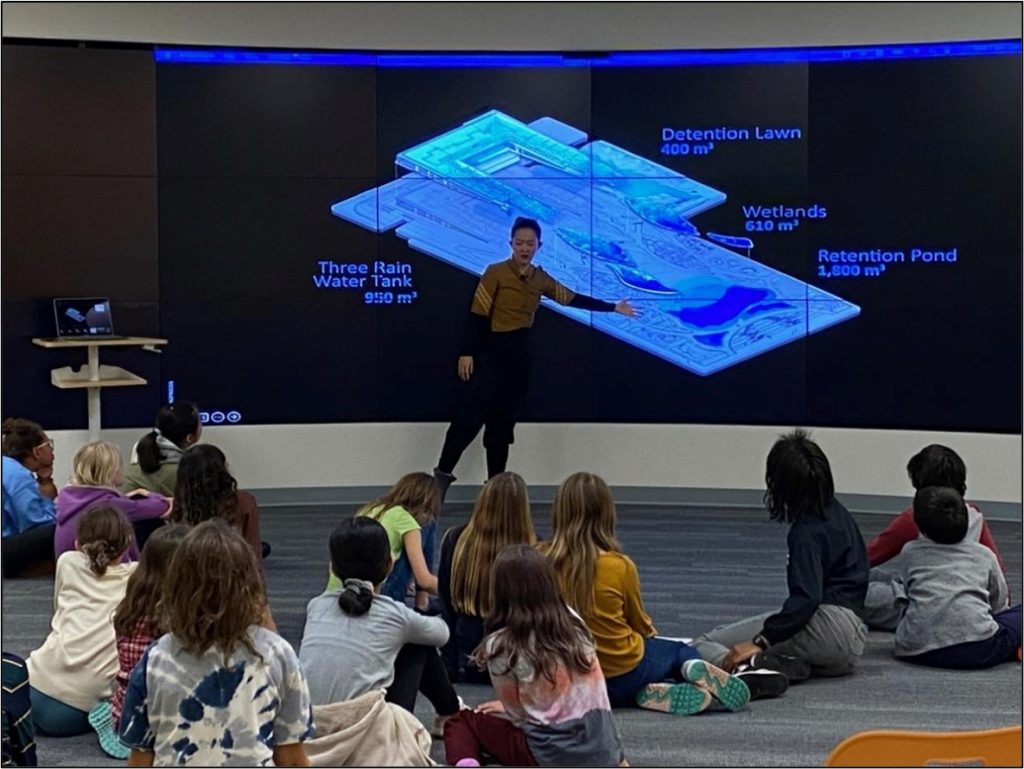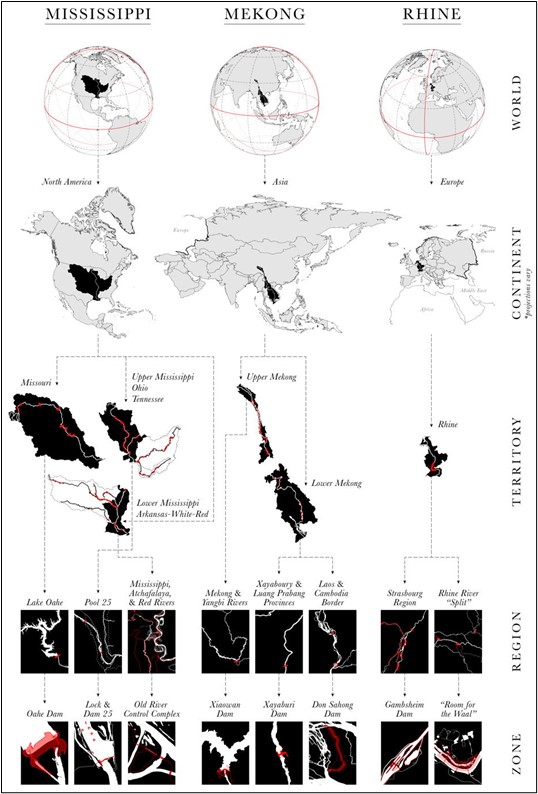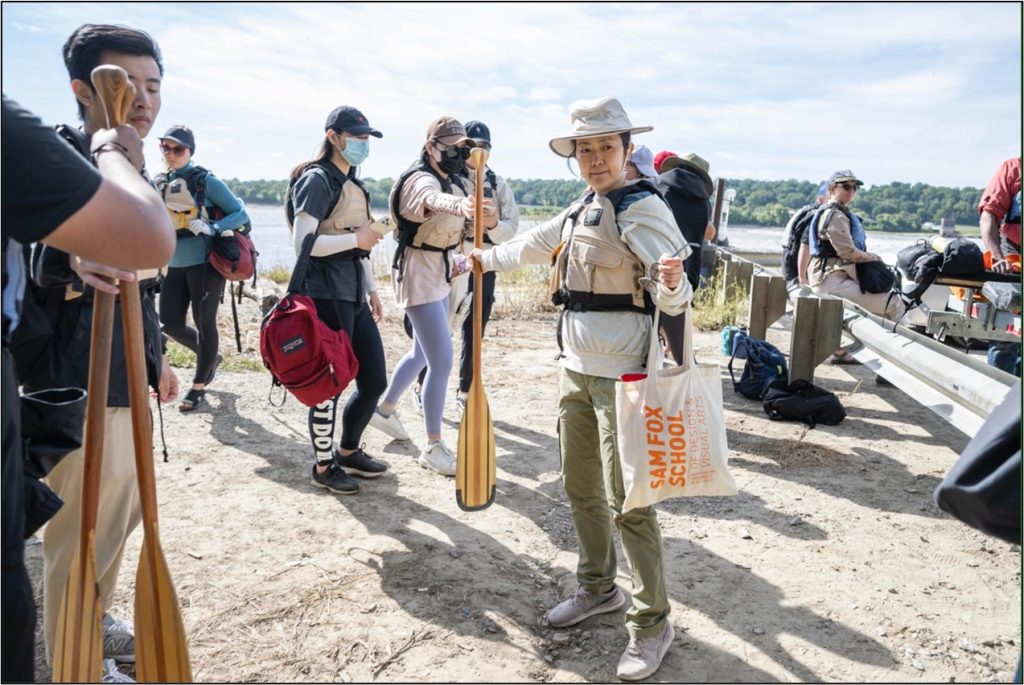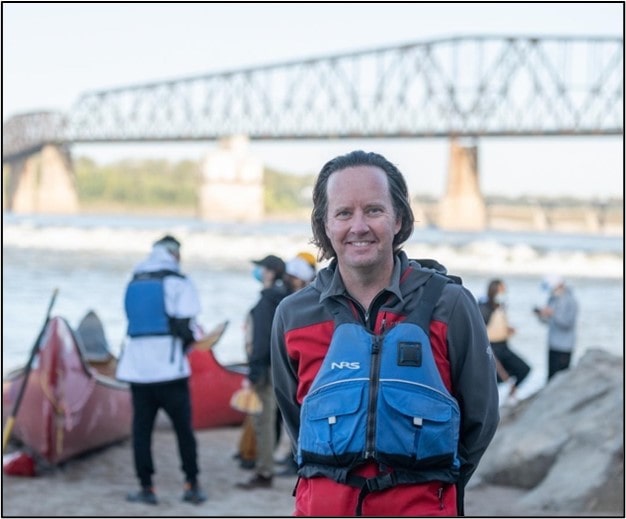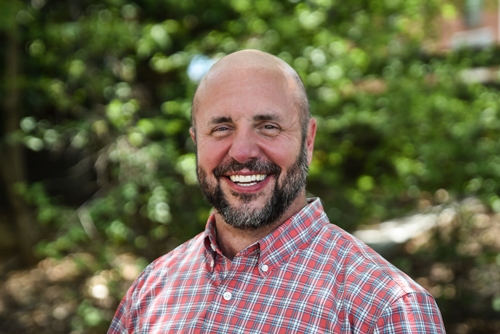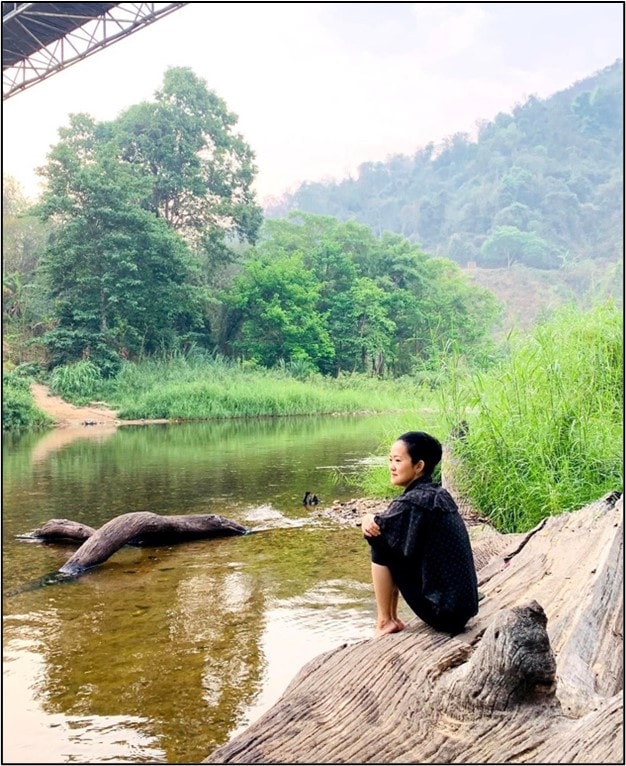What happens when a world-renowned landscape architect from Thailand comes to the United States as Designer-in-Residence to work with an award-winning architect whose passion is what he defines as watershed architecture? It has been a year since Season 4, Episode 10, when we first asked that question of our guests, and now it’s time for an update.
In Season 6, Episode 8, hosts Sarah Thorne and Jeff King, Lead of the Engineering With Nature® Program at the US Army Corps of Engineers (USACE), welcome back Kotchakorn Voraakhom (“Kotch”), an international member of the American Society of Landscape Architects and founder of Bangkok-based landscape architecture company LANDPROCESS, and Derek Hoeferlin, Chair of the Landscape Architecture program at Washington University in St. Louis. Derek and his colleagues at the Sam Fox School of Design & Visual Arts have been hosting Kotch on her year-long appointment as Designer-in-Residence, sponsored by the Pulitzer Arts Foundation.
A few years ago, Derek started discussions with the Pulitzer Arts Foundation about who their next Designer-in-Residence could be. The themes of the built environment and the impacts of climate change emerged, and that led to inviting Kotch to come to St. Louis. With her international perspective and shared interest and experience in climate-adaptive designs, the intention was for her to work on the challenges that climate change brings to St. Louis, with its flooding and droughts, and the community’s relationship to water in general.
Reflecting on her expectations for her year in St. Louis, Kotch said, “It is like a journey. When you travel into some new place or experience, you’re expecting one thing; but when you actually go through it, you run into different things that you were not expecting.” Kotch spent her time learning from the St. Louis community and, as she says, listening to the ecology systems of the Mississippi River. Her residency has “been a pause to relearn what I have learned. As a practitioner, you want to conquer the world. You want to change the world. But in the end, you just have to let the world change you as well.”
Kotch taught Derek’s students at Washington University, held several workshops with St. Louis community members, engaged with a range of people from USACE to understand their perspectives and actions along the Mississippi River system, and talked with people in small towns along the Mississippi who are dealing with perpetual flooding. “I did a workshop with teenagers around neighborhoods in St. Louis who probably have some idea about climate change but don’t really know what they can do about it. I met with middle school students to really understand what the new generation is thinking about these problems. All these different perspectives just blew me away. I learned that we are really focused within our respective silos of thinking. Many times, we forget about intergenerational relationships—that we need to groom the younger generation, the next generation of designers, the middle school kids who are so scared of the change and don’t know what they can do.”
Kotch says she came in with the expectations of a practitioner, working with the specifics of construction drawings and budgets, but her journey over the past year—working with Derek’s students and a broad range of stakeholders—has really transformed her thinking. “To fix the problem, you actually have to really understand. Then the question is, are you, as a human, adapting nature, or are you adapting yourself?” Later in the conversation, she notes, “Nature has the final word.”
Kotch has had a lot of experiences with rivers around the world but found that the scale of the Mississippi River has changed her. “I feel like I’m an ant, like so small. The perception of being in the river just changed me as a person. Just knowing one river or another river makes you question what you know about other rivers around the world that are confronting the same issues. It’s really not a very intellectual kind of experience. It’s a very spontaneous kind of like learning.”
“Kotch, in many ways, you’ve become an ambassador for nature,” Jeff notes. “You’re taking what you’ve learned in Thailand and sharing it with American communities and American leadership. And then you’re taking what you’ve learned here back to Thailand, communicating about a variety of different things that you picked up while in residence. That’s fantastic.” Kotch replies, “I love Ambassador for Nature. That’s what we all need to do.”
Derek reflects a similar kind of experience in wanting to change the world, while also being open to being influenced by it. His journey reflects a 15-plus-year project to investigate what he calls “watershed architecture” and his interest in how watersheds can reflect a tipping point in time. Derek has been influenced by seeing large-scale climate-related disasters, such as Hurricane Katrina, and thinking about what it means to design buildings when faced with the complicated, large-scale context of frequent climate-related disasters. “As designers, we look at these larger-scale events and watersheds and what they mean for design decisions. Specifically, how can we engage water better within our design decisions. But that begs the question of why should a landscape architect be part of river-basin-scale transformation? I think that’s where we are right now with our conversation with the Engineering With Nature Program. We’re trying to think of a much more holistic way to bring communities into the next phase of this transformation, hopefully, much more ecological, community-sensitive way.” These are some of the themes that Derek addresses in his recently published book, Way Beyond Bigness: The Need for a Watershed Architecture. The book examines the Mississippi, the Mekong, and the Rhine River basins and the decisions made around those watersheds and how to make them more interconnected with the communities along those three basins.
“Derek, you touched on something that I think is truly exciting—you didn’t limit your conversations in the book to just one discipline. You’ve expanded those conversations to experts from different fields.” Jeff added: “You mentioned landscape architects, scientists, and engineers. All of them have perspective and insight that is very meaningful and is needed to better understand systems and find the right approach for integrating nature or restoring nature into these systems.” Kotch adds: “When we think about dams and similar structures, we only think about engineers. When we think about trees and subscape, we only think about landscape architects. But the world is changing, and the challenge is to go way beyond the business-as-usual thinking. We have to be more innovative and work together.”
Reflecting on his experience working with Kotch, Derek notes, “From when I first met Kotch, before the residency, she taught with me in our Landscape and Urban Design program. One of the big things we did was we went to Bangkok to be able to experience and hear from the communities that Kotch was working with. It took me out of the context of St. Louis and the Mississippi River. Coming back here, Kotch started to work with my network. I reconnected with the people I’ve worked with for with many years but had the opportunity to do it in a new conversational context with Kotch there. That made me reflect and think differently about how I could move forward working with these great groups of people in St. Louis and beyond.”
For Kotch, her reflection on her year in residency is one of gratitude and appreciation for the opportunity: “If it’s one word, I would say ‘gratitude’ that I’m learning from the whole experience. The Sam Fox School, Derek, Matt, and Kristen from Pulitzer have all worked so hard, helped me so much to experience, learn, and relearn. I love one quote from José Martí, a famous Cuban writer and philosopher. He says, ‘In a time of crisis, the peoples of the world must rush to get to know each other.’ I just feel that this is the time that we get to learn from each other, to know each other. To ask, what is your solution? What is my solution? What’s your problem? What can we do better? Through this whole years’ experience, the chord that resonates so much is that climate change is a crisis. We need to rush to get to know each other, to listen to each other. Thank you so much, Derek, for this great year. And thank you to all your team.”
Jeff closes noting the inspiration that Derek and Kotch’s work together brings, “I think that is so very true, that to be able to address these issues concerning climate change, that it really is going to take us getting to know one another, to understand and appreciate our uniqueness as individuals, but also how do we harmonize as humans. Please keep pursuing and delivering good strategies and good solutions that will help us get past these existential threats. What you both are doing is incredibly inspiring for future landscape architects and others. You’re opening our eyes to the possibilities ahead and certainly in how you’re looking at nature-based solutions at a system scale. You’re really demonstrating value in how you’re able to capture information from communities and practitioners and really listening to those that can help us solve these problems. As Derek calls it, it’s ‘designing a solution,’ and it’s important that we do that.”

